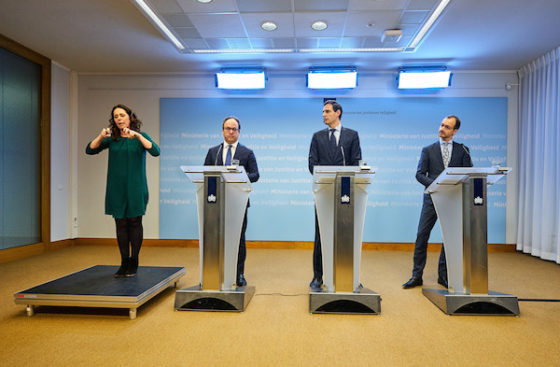Ministers unveil package to save jobs, incomes and companies


The cabinet is expanding the scheme to help companies pay the wages of workers who have been laid off because of the coronavirus crisis and will help bail out freelancers whose income has dried up.
The new measures were announced by finance minister Wopke Hoekstra, economic affairs minister Erik Wiebes and employment minister Wouter Koolmees at a press conference in The Hague on Tuesday evening.
‘Our aim is to limit the economic effects so that people keep their jobs and an income and that the companies stay intact,’ finance minister Wopke Hoekstra said. ‘But we have to be honest and we cannot rule out some companies not making it.’
The ruling for paying benefits to staff who have been laid off is being replaced by a new one under which the government will fund 90% of salaries.The measure is also being expanded to cover people on zero hour or call-out contracts, who have been left with no income at all in some sectors.
Some 78,000 companies have already applied for funding under the old scheme since coronavirus erupted, causing the website to crash on at least two occasions. ‘The new scheme is now being worked on day and night, so please be patient,’ Koolmees said.
The cabinet is also expanding the credit options for small and medium-sized firms and will make it easier for freelancers to claim benefits to top up their income if their contracts dry up.
‘There will be no partner or asset check in this and the money will not have to be repaid,’ Koolmees said. However, the new system still has to be put in place and freelancers should not apply to local authorities for help immediately, but wait for further details, Koolmees said.
Companies and freelancers will also be able to delay tax payments without having to pay fines and there will be an emergency payout of up to €4,000 for companies which have been hardest hit, such as the hospitality industry, travel and cultural sectors.
In total, the package will add up to €10bn to €20bn over the next three months, but the total depends on how many firms apply for help, Hoekstra said. ‘We remain realistic and it will not be easy, but during this period we have to work together to get through this.’
Shops
The economic fall-out of coronavirus continues to be felt. Although non-food shops have not been closed, many are adjusting their opening hours and Ikea has said it is closing all its Dutch branches because ‘the health of staff and customers is a top priority’. In addition, the Bijenkorf department store is closing its stores.
Taxi drivers are also suffering, with Uber drivers reporting plummeting incomes. One driver from The Hague told the Volkskrant he had earned €1,382 a week from 92 journeys at the start of the month but that had fallen to €485 from 42 trips a week ago. On Tuesday morning he had earned nothing.
Many Uber drivers use leased cars and some are paying up to €900 a week for their vehicles and now face financial ruin, the Volkskrant said. Others are concerned that they are being exposed to customers who carry the virus.
Uber told the paper that the company is supporting drivers who are diagnosed with coronavirus or are placed in quarantine and is in talks with lease companies and insurers about showing leniency to drivers who have been hard hit financially.
Thank you for donating to DutchNews.nl.
We could not provide the Dutch News service, and keep it free of charge, without the generous support of our readers. Your donations allow us to report on issues you tell us matter, and provide you with a summary of the most important Dutch news each day.
Make a donation